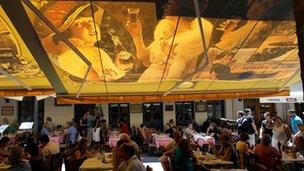Europe's long, uncomfortable summer
- Published
- comments

Greece may get a new government, but the crisis seems certain to return later in the year
Events, with all their unpredictability, are driving the European crisis. Europe's leaders have plans, but they are not in control.
They react, but they cannot manage this crisis. They repeatedly make mistakes because they do not understand the crisis they have created.
When Spain's banks needed rescuing European officials allowed themselves a moment of congratulation.
They had not just acted decisively, in their view, but in coming up with 100bn euros (£81bn; $127bn) they believed they had drawn a line under the problem.
The Spanish Prime Minister Mariano Rajoy said: "The credibility of the euro won, its future and the EU".
Within hours, outsiders realised that this 100bn euros was a loan which would add to Spanish government debt.
The bank bailout was an admission that Spain itself could not protect its banks and therefore exposed its own weakness. So a bailout of the banks has only deepened the Spanish crisis.
European officials veer from one favoured remedy to another. At one stage it was building up rescue funds. For a period, the emphasis was on common debt, eurobonds. The current favourite is a banking union.
Trapped
Already, expectations for the summit at the end of next week are being downgraded. The President of the European Council, Herman Van Rompuy, has hinted that no definitive measures will be agreed. It would be more about setting out a roadmap.
"Even if we, in June, will not take definitive decisions, the path and trajectory are very clear for everybody," he said.
So there will probably be agreement on the need for greater supervision of national banks. The much more sensitive issue of a joint bank deposit guarantee is for the longer term.
And that brings us to the dilemma at the heart of the crisis. The eurozone is made up of 17 different countries that still see their identity in the nation state.
None of them have voted for a full fiscal union - where tax and spending are decided at European level - let alone a political union.
And yet, many of Europe's leaders believe the single currency can only be saved by much closer integration.
Germany's Chancellor Merkel believes that only with fiscal and political union can the zone consider common debt.
The mood, however, in Europe is not in favour of further integration. Parties wary of a centralisation of power in Brussels have performed well in the polls.
UK Prime Minister David Cameron understands the dilemma. Speaking in Mexico, he said: "It was very difficult politically to take the steps that are required economically."
And so Europe is trapped. It understands that an entirely different eurozone and European Union may be needed to save its currency, but it shies away from a "big leap" that might not have the backing of the people.
So the frustration. It bubbled over yesterday when the President of the European Commission, Jose Manuel Barroso, said in Mexico: "We are not coming here to receive lessons in terms of democracy or in terms of how to manage our economy."
Europe's leaders like to say that the crisis started in America in 2008 and not in their own backyard. It didn't. The crisis started when the criteria for joining a single currency were fudged, allowing in countries like Greece.
But the real roots of the crisis lay in such different economies sharing the same interest rate. It led, in some countries, to unsustainable bubbles that the crisis in 2008 only exposed.
The dilemmas are not just fundamental.
France, later this month, will receive a report from its auditors on the true state of French finances. Almost certainly, France will need to make extra savings this year and next.
The honeymoon period for President Hollande will be truly over. What will the champion of "growth first" do as he struggles to live up to his commitment to reduce the deficit to 3% by next year?
Cost of the crisis
Greece is fundamentally unstable. The political turmoil has meant that it will fail to meet its budget targets.
Further savings are due whilst its economy is in freefall.
Will Europe loosen the strings and give Athens more time to balance its budget? It is another dilemma.
Some, like the Austrian chancellor, say that "one should also give the Greek population air to breathe".
Angela Merkel, however, says "there can be no loosening of the reform steps". The Greek crisis almost certainly will return later this year.
The fundamental questions for the eurozone lie unanswered. What, in the final analysis, stands behind this currency? How will large countries like Spain and Italy be saved if they get into trouble? Where will growth come from, without which there can be no solution?
And, at the end of the day, will Chancellor Merkel persuade the German people that they will have to pay - vast amounts - to save the euro? And will Europeans be willing to sacrifice democracy if that is the price of ending the crisis?
The dilemmas of the European summer.